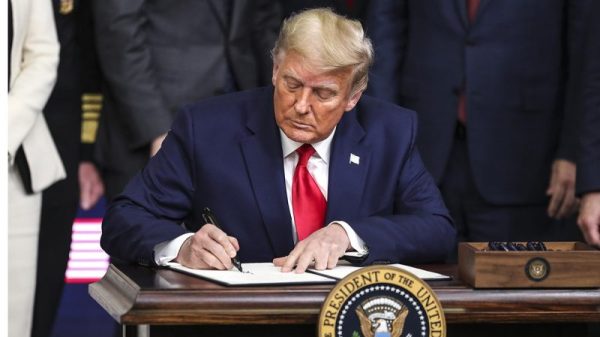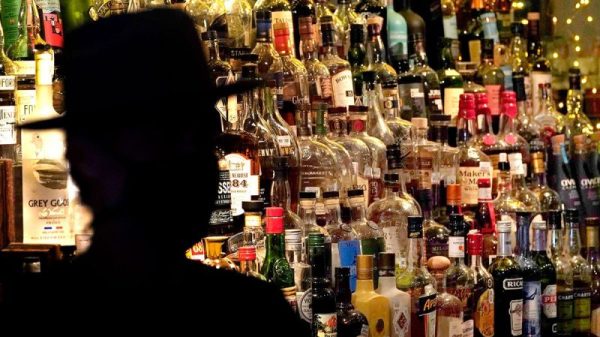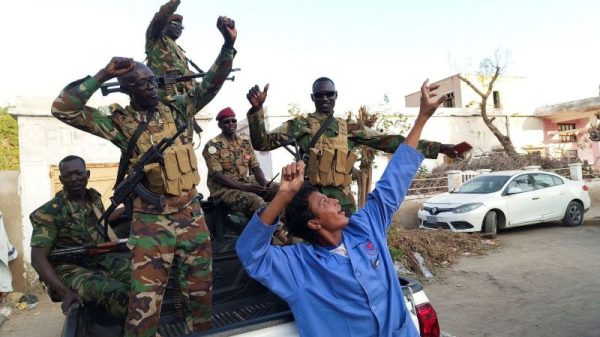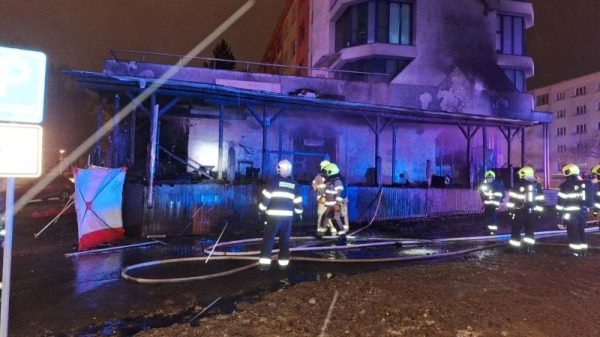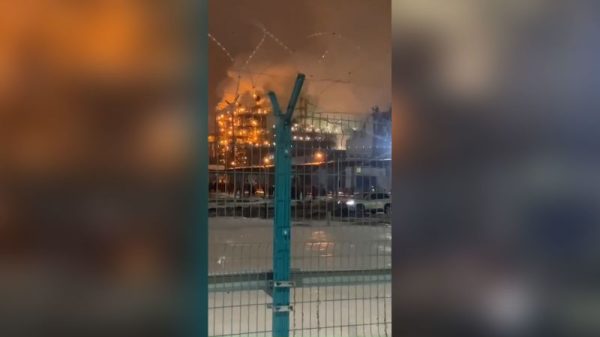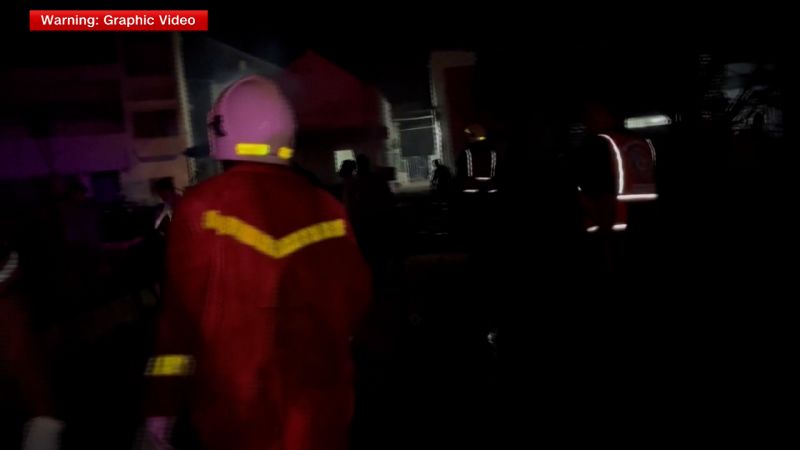Protests erupted across the Middle East following the deadly explosion at a Gaza hospital, with Israeli and Palestinian officials trading accusations over who was to blame as US President Joe Biden arrived in Tel Aviv.
Hundreds of people were likely killed in the blast on Tuesday at the Al-Ahli Baptist Hospital in the center of Gaza City, where thousands were sheltering from Israeli strikes, the Palestinian Health Ministry said in a statement.
Hamas said more than 500 people were killed in the blast. The Palestinian Health Ministry said preliminary estimates indicate that between 200 to 300 people died.
Palestinian officials have blamed Israeli airstrikes for the lethal incident, but Israel has insisted it was not responsible.
In a televised news conference Wednesday, Israeli military spokesman Rear Adm. Daniel Hagari claimed a lack of structural damage at the hospital proved the Israel Defense Forces (IDF) were not involved in the explosion. He claimed IDF intelligence showed that Palestinian Islamic Jihad – a rival Islamist militant group to Hamas in Gaza – caused the explosion when one of its rockets launched at Israel misfired.
Hagari also said the IDF had intelligence of “communications between terrorists” of rockets misfiring, which included mention of the hospital.
Islamic Jihad denied Israel’s assertions describing them as “false and baseless” and claimed it does not use public facilities such as hospitals for military purposes, according to a statement Wednesday.
The blast marks a dangerous new phase in Israel’s war with Hamas, which threatens to spill over regionally, and has added to fears that the humanitarian situation in Gaza is spiraling “out of control.”
‘Unparalleled and indescribable’
Dr. Ashraf Al-Qudra, a spokesperson for the Palestinian Ministry of Health in Gaza, described “unparalleled and indescribable” scenes after the blast.
“Ambulance crews are still removing body parts as most of the victims are children and women,” Al-Qudra said. “Doctors were performing surgeries on the ground and in the corridors, some of them without anesthesia.”
In pictures: The deadly clashes in Israel and Gaza
Images show women crying out and terrified children covered in black dust huddled together on the hospital floor.
Calling the deadly hospital blast “unacceptable,” UN Human Rights chief Volker Turk said hospitals are sacrosanct and the killings and violence must stop.
“Words fail me. Tonight, hundreds of people were killed – horrifically – in a massive strike… including patients, healthcare workers and families that had been seeking refuge in and around the hospital. Once again the most vulnerable,” Turk said in a statement.
Diplomatic fallout
The fallout from the blast threatens to derail US diplomatic efforts to ease the humanitarian suffering in Gaza, where concerns are mounting over Israel’s deprivation of food, fuel and electricity to the enclave.
More than a week of Israeli bombardment has killed at least 3,300 people and injured 12,500 in Gaza, according to Palestinian authorities.
President Biden’s high-security wartime visit to Tel Aviv to meet Israeli Prime Minister Benjamin Netanyahu marks his most forceful public show of support for Israel since the brutal October 7 Hamas attacks, in which the Islamist militant group killed at least 1,400 people and took more than 150 hostages, including children and the elderly.
Biden told the Israeli leader in a meeting on Wednesday that the hospital attack “appears as though it was done by the other team, not you.”
“But there’s a lot of people out there not sure,” he added.
Biden was scheduled to visit the Jordanian capital Amman after his trip to Tel Aviv, though a White House official said the trip was “postponed.”
Jordan canceled a planned Wednesday summit between Biden and the leaders of Jordan, Egypt and the Palestinian Authority. Palestinian Authority President Mahmoud Abbas pulled out of the meeting earlier Tuesday in the immediate aftermath of the explosion.
“There is no point in doing anything at this time other than stopping this war,” Jordan’s Foreign Minister Ayman Safadi told Al Jazeera Arabic early Wednesday. “There is no benefit to anyone in holding a summit at this time.”
Several nations, including Saudi Arabia, Jordan, Egypt and the United Arab Emirates have released statements condemning Israel following the explosion. Pakistan called it “inhumane and indefensible” and Palestinian observer to the UN Riyad Mansour said Israeli officials were being dishonest in blaming Islamic Jihad.
Anger spreads
The blast has added fuel to rising anger in the region over Israel’s actions in Gaza.
Protests condemning the hospital explosion have erupted in multiple cities across the Middle East and North Africa, including in Jordan, Lebanon, Iraq, Iran and Tunisia. Protests also rocked the occupied West Bank city of Ramallah as demonstrators clashed with Palestinian security forces.
Nowhere is safe
The hospital tragedy comes as health services in Gaza are on the brink, with no fuel to run electricity or pump water for life-saving critical functions. UN agencies have warned that stores are less than a week away from running out of food stocks and that Gaza’s last seawater desalination plant had shut down, bringing the risk of further deaths, dehydration and waterborne diseases.
While the IDF has said it does not target hospitals, the UN and Doctors Without Borders say Israeli airstrikes have struck medical facilities, including hospitals and ambulances.
Conditions are dire for the 2.2 million people caught in the escalating crisis and now trapped in Gaza and those on the ground warn that nowhere is safe from relentless Israeli airstrikes and the rapidly deteriorating humanitarian situation.
Urgent calls for help are mounting and diplomatic efforts to secure a humanitarian corridor out of Gaza have ramped up in recent days.
US Secretary of State Antony Blinken, who has led intense efforts across the Middle East, on Tuesday said the US and Israel “have agreed to develop a plan that will enable humanitarian aid from donor nations and multilateral organizations to reach civilians in Gaza.”
But officials have said the Rafah border crossing – the only entry point in and out of Gaza that Israel does not control – remains extremely dangerous.
“Until now, there is no safe passage that has been granted,” he said, as they do not “have any authorization or clear, secure routes for those convoys.”
He added that the crossing was bombed four times in the past few days.
The situation in Gaza is now spiraling “out of control,” World Health Organization Director-General Tedros Adhanom Ghebreyesus warned on Wednesday.
Tedros said that WHO’s supplies have been stuck at the border for four days, adding “every second we wait to get medical aid in, we lose lives.”













